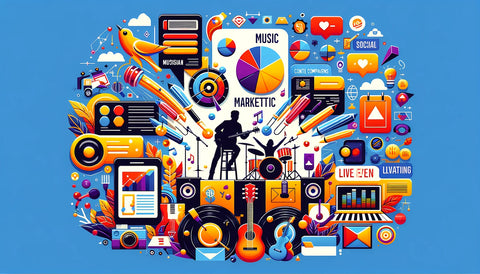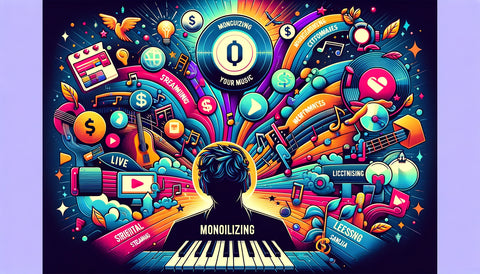
From Novice to Pro: Mastering the Business of Music for Success
Share
Entering the music industry can seem like venturing into a vast, intricate labyrinth with no clear map to success. However, the journey from a novice to a professional in the music business doesn't have to be shrouded in mystery. "From Novice to Pro: Mastering the Business of Music for Success" is designed to illuminate the path for aspiring musicians, producers, and entrepreneurs.
This guide aims to equip you with the knowledge and strategies necessary to navigate the complexities of the industry. Understanding the music industry's landscape, building a compelling brand, managing your music rights, employing savvy marketing strategies, and finding innovative ways to monetize your music are crucial steps in your journey to mastery.
Whether you're a budding artist in a garage or an ambitious entrepreneur with a vision, the music business offers endless opportunities for those ready to learn its secrets and apply them diligently. The road to success in the music business is paved with knowledge, creativity, and persistence.
Let's embark on this journey together, exploring each key area to help you emerge not just as a participant in the music industry but as a master of your craft and business.

1. Understanding the Music Industry Landscape
The music industry is a multifaceted world, combining art, technology, business, and law into a complex ecosystem. To navigate it successfully, understanding its various components and how they interact is essential. This segment aims to shed light on the key aspects of the music industry landscape and provide insights into leveraging them for your career.
The Evolution of the Music Industry
The music industry has evolved dramatically with technological advancements. From vinyl records to cassette tapes, CDs, and now digital streaming, each era has introduced new challenges and opportunities. Today, digital streaming platforms like Spotify, Apple Music, and Tidal dominate, offering artists unprecedented global reach but also introducing complexities in copyright, royalties, and distribution.
Key Players in the Music Industry
Understanding who the key players are is crucial. They include record labels, music producers, artists, managers, live event organizers, and music streaming services. Each plays a specific role in an artist's career development, from production and promotion to distribution and live performances.
Record Labels and Distribution
Record labels have traditionally been the gatekeepers of the music industry, responsible for discovering talent, producing albums, and marketing artists. However, the rise of digital distribution platforms has empowered artists to bypass traditional routes, offering direct access to their audience. This shift has democratized music production and distribution but also made the market more competitive.
The Role of Digital Platforms
Digital platforms have revolutionized how music is consumed, marketed, and monetized. Social media platforms like Instagram, TikTok, and YouTube are not just promotional tools but pivotal in creating viral music trends. Understanding how to effectively use these platforms can significantly impact an artist's visibility and engagement with their audience.
Navigating Copyrights and Royalties
Copyrights and royalties are fundamental aspects of the music business. Protecting your intellectual property and understanding the royalties you are entitled to from different revenue streams—be it streaming, physical sales, or performance rights—is critical. Knowledge of copyright laws and affiliation with performance rights organizations can ensure artists receive the earnings they deserve.

2. Building Your Brand and Online Presence
In today's digital age, building a strong brand and online presence is crucial for musicians aiming to stand out in a crowded market. Your brand is not just your music but the entire experience you offer your audience—from your visual aesthetics to how you communicate your story. This segment explores effective strategies for crafting a compelling brand identity and maximizing your online presence.
Crafting Your Brand Identity
Your brand identity encompasses everything that represents you as an artist. It includes your name, logo, the themes of your music, your visual style, and your communication tone. A distinctive and cohesive brand identity makes you memorable and helps build a loyal fanbase. Think of your brand as a promise to your audience—a consistent experience that they can expect from all your interactions.
Leveraging Social Media
Social media platforms are powerful tools for building and engaging your audience. Each platform offers unique features that can showcase different facets of your brand. Instagram is excellent for visuals and stories, Twitter for conversations and updates, YouTube for music videos and behind-the-scenes content, and TikTok for viral music clips and challenges. The key is consistent, authentic engagement with your audience, using these platforms to tell your story and showcase your music.
Engaging Content Creation
Content is king in the digital world. Creating engaging, high-quality content that resonates with your audience is essential. This can include music videos, live performances, behind-the-scenes footage, interviews, or interactive content like Q&As and live streams. Your content should reflect your brand identity and values, providing value and entertainment to your audience.
Building a Professional Website
While social media is crucial, having a professional website gives you a central hub for your brand. Your website should include your bio, music catalog, tour dates, contact information, and a press kit. It's also a platform you fully control, free from the changing algorithms of social media, where you can collect email addresses to build your mailing list for direct fan engagement.
Analyzing and Adapting
Finally, building your brand and online presence is an ongoing process. Use analytics tools provided by social media platforms and your website to track engagement and understand your audience better. This data allows you to adapt your strategies, refine your content, and ensure you're reaching your target audience effectively.

3. Music Production and Rights Management
The creation of music is an art that marries creativity with technical prowess. However, ensuring that your work is protected and that you're fairly compensated for its use is just as crucial. This section delves into the intricacies of music production and the importance of rights management for artists.
The Music Production Process
Music production is the process of creating, composing, recording, and refining a piece of music. It involves various stages, from the initial songwriting and arrangement to recording, mixing, and mastering. Modern music production heavily relies on digital audio workstations (DAWs), software that allows for intricate editing, sound manipulation, and production. A well-equipped home studio can now accomplish what once required a large, expensive recording studio, democratizing music production.
Protecting Your Work
As an artist, your music is your most valuable asset. Protecting it involves understanding copyright laws and ensuring your work is copyrighted. Copyright provides legal protection for your music, preventing others from using it without permission. It's an automatic right that begins the moment your music is recorded or written down. However, formally registering your copyright can provide additional legal benefits, including the ability to sue for copyright infringement.
Managing Rights and Royalties
Rights management is crucial in the music industry. It involves tracking where, how, and by whom your music is used, ensuring you receive the appropriate royalties. This includes mechanical royalties from album sales, performance royalties from radio play and live performances, and synchronization fees for music used in film, TV, and advertisements. Joining a performance rights organization (PRO) can help manage these aspects, collecting and distributing royalties on your behalf.
Navigating Licensing and Distribution
Licensing your music for use in media or through music distribution services can provide additional revenue streams. Understanding the terms of these licenses and agreements is vital to ensure you're fairly compensated and retain control over your work's use. Digital distribution platforms have made it easier than ever to get your music to a global audience, but they also take a cut of your profits. Navigating these agreements carefully is crucial.
The Role of Music Publishers
Music publishers play a significant role in rights management, working to promote your music, secure licensing deals, and collect royalties. For many artists, partnering with a music publisher can be a way to maximize the earning potential of their music while focusing on the creative aspects of their career.

4. Marketing Strategies for Musicians
In the digital era, marketing has become an indispensable tool for musicians seeking to carve out a niche in the highly competitive music industry. Effective marketing strategies can elevate an artist's visibility, engage a wider audience, and ultimately drive music sales and streams. This section explores various marketing strategies that musicians can leverage to boost their careers.
Embracing Social Media Marketing
Social media platforms offer unparalleled opportunities for artists to connect with fans and promote their music. A well-crafted social media strategy should include regular posts, engaging visuals, and interactive content such as live streams or Q&As. Platforms like Instagram, TikTok, and Twitter can help artists build a personal connection with their audience, share their music journey, and announce new releases or events.
Leveraging Email Marketing
Despite the rise of social media, email marketing remains a powerful tool for direct communication with fans. Building an email list allows artists to send personalized updates, exclusive content, and announcements directly to their most engaged fans. This direct line of communication can be instrumental in promoting new music releases, merchandise, or upcoming shows.
Content Marketing: Telling Your Story
Content marketing is all about storytelling. Through blog posts, videos, and podcasts, artists can share their journey, inspirations, and behind-the-scenes glimpses into their creative process. This type of content not only builds deeper connections with fans but also enhances an artist's online presence, making their music more discoverable to new audiences.
Collaborating with Influencers and Other Artists
Partnerships with influencers and collaborations with other artists can significantly expand an artist's reach. Influencers can introduce music to their followers, while collaborations allow artists to tap into each other's fanbases. These partnerships should be authentic and align with the artist's brand and musical style.
Promoting Live Events and Tours
Live performances are a critical component of an artist's marketing strategy, creating memorable experiences for fans and generating buzz around their music. Promoting these events through social media, email marketing, and local media can help increase attendance and engagement. Additionally, selling merchandise at live events can provide another revenue stream and further promote the artist's brand.

5. Monetizing Your Music
For many musicians, creating music is a passion, but it's also essential to generate income from their art to sustain their career. Fortunately, the digital age offers numerous avenues for artists to monetize their music. This section highlights various strategies musicians can employ to diversify their income streams.
Digital Streaming Revenue
Streaming platforms like Spotify, Apple Music, and Tidal have become primary sources of music consumption. While individual streams may pay small amounts, collectively, they can add up to significant earnings, especially as your audience grows. Ensuring your music is available on all major platforms is key to maximizing streaming revenue.
Live Performances
Live performances remain one of the most lucrative income streams for musicians. Beyond ticket sales, concerts provide opportunities for merchandise sales, VIP experiences, and meet-and-greets, which can significantly increase revenue. Building a strong live performance reputation can lead to more bookings and higher performance fees.
Merchandise Sales
Selling merchandise is a direct way to earn income while also promoting your brand. T-shirts, hats, vinyl records, and other branded items allow fans to support you beyond just streaming your music. Online platforms and social media make it easier than ever to sell merchandise, reaching fans worldwide.
Licensing and Sync Fees
Licensing your music for use in films, TV shows, commercials, and video games can provide substantial income through sync fees. Additionally, these placements can introduce your music to new audiences. Working with a music publisher or licensing agency can help you secure lucrative licensing opportunities.
Crowdfunding and Fan Support
Platforms like Patreon, Kickstarter, and Bandcamp allow fans to support their favorite artists directly. Whether through crowdfunding campaigns for specific projects or ongoing support in exchange for exclusive content, these platforms offer a way to monetize your fanbase's dedication and support.
Teaching and Workshops
For those with a knack for education, teaching music or conducting workshops can be an additional revenue stream. Sharing your expertise through online courses, private lessons, or workshops not only provides income but also helps inspire and educate the next generation of musicians.
Conclusion
The journey through the music business is as challenging as it is rewarding. From understanding the industry landscape to building a brand, managing rights, employing effective marketing strategies, and finding innovative ways to monetize your music, each step is crucial in carving out a successful career in this dynamic field. "From Novice to Pro: Mastering the Business of Music for Success" has aimed to illuminate these steps, providing a roadmap for aspiring musicians and industry professionals alike.
The music industry continues to evolve, and with it, the strategies for success. However, the core principles of hard work, adaptability, and creativity remain unchanged. By embracing these values and leveraging the insights provided, you're not just preparing to navigate the complexities of the music business; you're setting the stage for a thriving career that transcends trends and technologies.
Remember, the path to music business mastery is a personal journey. What works for one artist may not work for another. The key is to stay true to your artistic vision, continuously learn and adapt, and build meaningful connections with your audience and peers. With perseverance and a strategic approach, the possibilities are limitless.
As you move forward, let this guide be a beacon in your pursuit of music business mastery. The road ahead is filled with opportunities for growth, innovation, and success. Embrace it with passion, and let your music echo across the industry.
